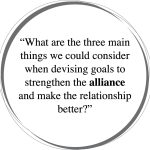 How can you make someone’s Goals more Person-Centred?
How can you make someone’s Goals more Person-Centred?
To strengthen the relationship, rapport and person-centred care, I think there are three main things to consider when devising goals.
- The Recognition of the Person’s Needs & Desires.
Foremost, the recognition of the Person’s Needs & Desires. Eliciting what the person needs & desires, not just what you or other supporter’s feel should be addressed. Quite often, the person’s impairments & vulnerability means that this is easily overlooked. Multiple times, what has been deemed as the goal I need to focus on, has been determined by others, not me! At these times, I don’t feel heard. I don’t want to participate. Achieving good outcomes is unlikely.
Make it an empowering experience. Hear from the person to learn what is meaningful to them and how we can incorporate that into the goal. How we can tap into their skills that they can bring to the goal. Also enable them to work with us to holistically explore their needs. Perhaps explore with them about their thoughts around the ‘barriers’ and ‘enablers’ to achieving these goals.
For me, as I am very physically impaired, the physical barriers and enablers have often been easily identified and explored. However, I thinking have space to look at the inevitable emotional and invisible obstacles would’ve been so powerful.
Perhaps identify what the person’s main obstacles and fears are in relation to each goal? What is it that is stopping them reaching a certain goal? Perhaps explore if these obstacles & fears are associated with their own behaviours and actions or another persons. What supports could be implemented in the goal that could help? How could you or they educate others to minimise these fears or concerns? Give the person space to reflect on their experiences and thoughts. Always aim to reduce the inevitable uncertainty that lies ahead and the associated anxiety in striving for a goal – make it possible!
Trusting to Disclose:
To strengthen the relationship, I feel that we need to really ensure that person feels able to disclose what they want to achieve. For me, many times throughout my recovery when my therapists would ask, “What is your goal Em?” At that time, my goal was “to tie up my shoelaces or cross a road”. However, I was too embarrassed in my vulnerable state to relay this. I feared their judgment. Instead, I’d often conjure up a more acceptable, inspiring goal, like climbing a mountain or running marathons again.Goals that I feel another would want to work with me on.Goals that would make my supporters proud! But, I’d often feel like I was alone with my goals, I didn’t feel supported. What’s more, I felt an enormous pressure to achieve these unrealistic goals!
A goal may’ve been pleasing to one’s supporters but it often is actually their goal, not the person’s. Plus, because they don’t own it, they’re likely to not want to practice it!i Make it meaningful to them. Enable them to visualise it in their life! Don’t devise goals that will only negate the rapport that you’ve developed and make them conjure up unrealistic goals that only lead to fear and disempowerment.
2. Education Component
Language-use & Framing Goals: I also think the way we use the term ‘goals’, is so crucial. Surely, when we really consider the language we use to not negate the rapport that we have built, we can empower a person. Even the term”goal” can be very overwhelming, disempowering and lacks meaning for many people. Although we need to devise goals to ensure that people are eligible for schemes such as the NDIS, I think how we go about eliciting these could be very different experience.
If people say to me “ Em what is your goal at the moment?” I seriously just feel overwhelmed. When, as a vulnerable person, you’ve already ascertained that your life goals can no longer be achieved because of the trauma you’ve acquired or been born with, it is such a confronting experience. From my perspective, contemplating this only leads to feelings of failure and disempowerment. It only makes me feel further away and more distant from that person.
For me, it feels that the clinician is clearly wanting to work on a goal with me and I’ll likely let them down. I feel gutted. Instead, I wonder if could we ask them in a more conversational, less intimidating way. Such as: ‘Em, what do you wish to achieve” and then ask a follow up like: “So what would that look like?” Then break it down with them, enable them to visualise it and get them to work out with you. Asking what supports they would need to make it possible.
We can go away and make that into a goal that would meet the reasonable and necessary criteria but in conversation with them, it’s likely not going to lead to a stronger relationship or feelings of empowerment.
3. Collaborative Component: Adding Support to Make it possible.
Lastly, I think to strengthen the relationships and person-centred care when devising goals, it’s vital that the person & all their supports are on the same page.
Ensuring that we inform all those involved about what the goal is. Perhaps explain what their role is to see it to it’s fruition. That it’s consistently applied in every environment. If one supporter is unclear, the person will not be enabled or supported to practise and go onto to achieve good outcomes.
I think ensuring that the person feels supported when participating to achieve that certain goal that we can adapt certain tasks and recommend supports (even taper them down overtime) so the goals are possible.
Giving the individual progressive feedback is also crucial so they feel motivated to continue & don’t feel stuck or alone with that goal. We can also ascertain if it still a relevant and meaningful goal. As you’ve heard me relay, if we don’t review where people are at, we can really hinder the relationship.
On a side note here – People often ask me, “Em, if a client has an unrealistic goal, do I support them?” My advice is to work with them to make it realistic and break it down.
By dismissing it, deeming it impossible, we are inadvertently devaluing them and crushing their hope. When someone believes in you & you feel supported, it’s amazing how much better you perform. Sure, they may fail but you’re there to support, not to limit and judge.Plus, it is likely in experiencing certain tasks to reach a goal that may decide it’s no longer important and no longer a goal. Whatever the outcome, it is vital that they feel able to share this with you. That you maintain the rapport so they feel able and supported to disclose that.
I have rambled here a lot, but hopefully the above spiel provides you with a few points to consider when developing goals with people!
Let’s choose to enhance our person-centred care, the rapport we develop and the overall experience for everyone!